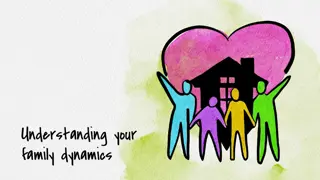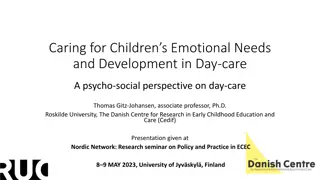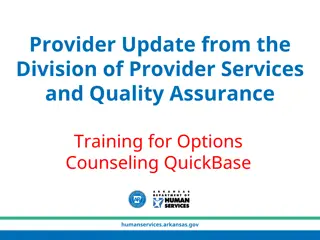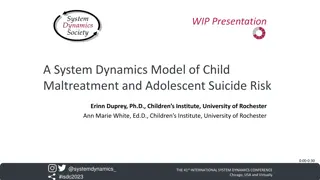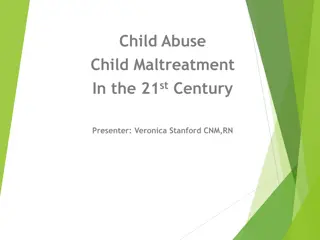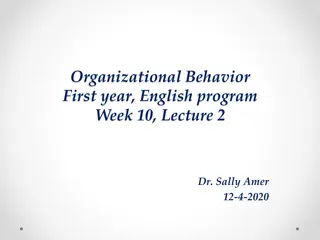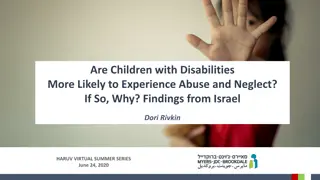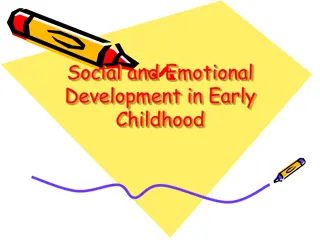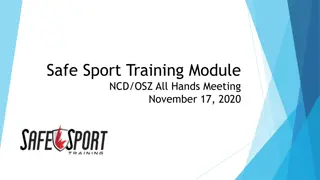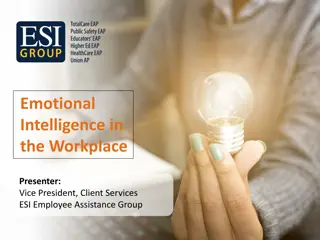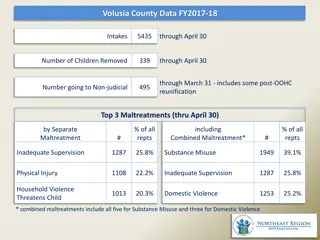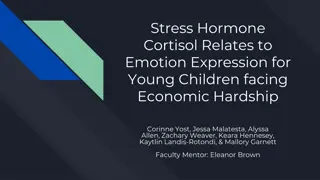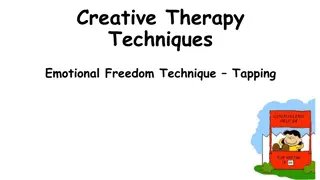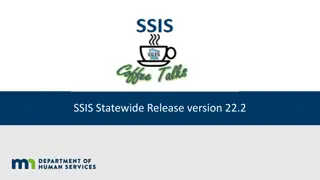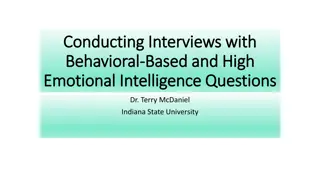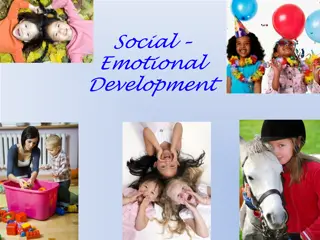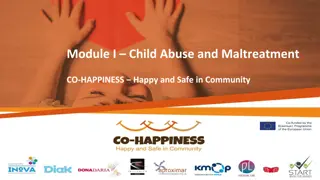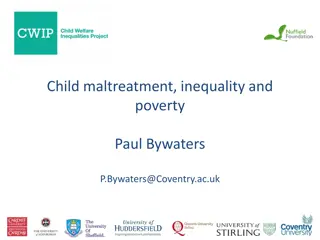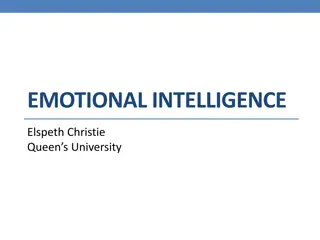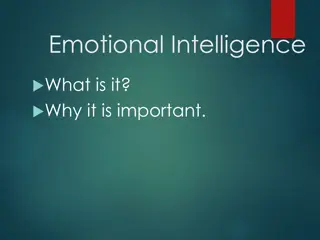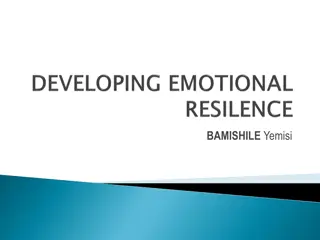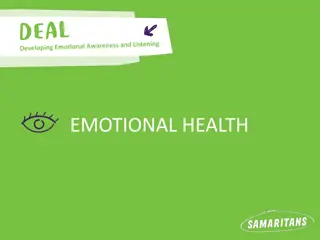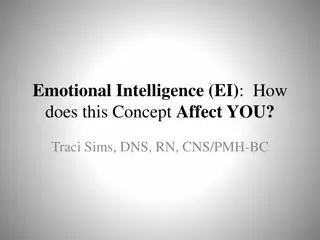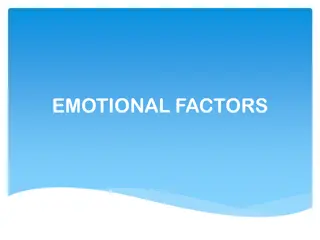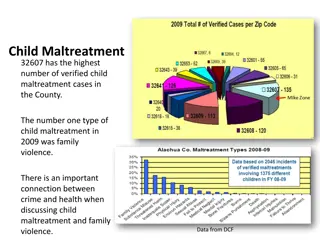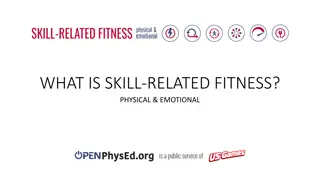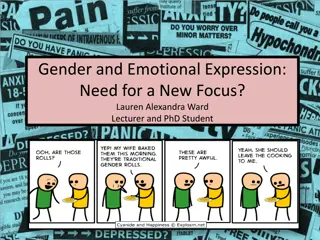Identifying Abusive Bruises in Children: The TEN-4-FACESp Clinical Decision Rule
Evidence-based screening tool TEN-4-FACESp helps healthcare professionals identify abusive injuries in children by recognizing specific patterns of bruising, especially in sensitive areas like the torso, ears, neck, and eyelids. It highlights the importance of reporting suspicious bruises, provides
3 views • 9 slides
Understanding Emotional Patterns in Families
Families play a crucial role in shaping individuals' emotional responses and behaviors. Caregivers influence how we perceive and manage emotions, impacting our emotional well-being. By examining how different emotions are accepted, rejected, and modeled within families, one can gain insights into th
10 views • 14 slides
Understanding Children's Emotional Development in Daycare from a Psycho-Social Perspective
Scientific evidence emphasizes the early onset of emotional development and its profound impact on lifelong outcomes. The quality of childcare processes plays a pivotal role in shaping children's social-emotional development, highlighting the importance of nurturing emotional relationships in daycar
0 views • 10 slides
Provider Update & Division of Provider Services in Arkansas
The Division of Provider Services & Quality Assurance (DPSQA) in Arkansas oversees investigations into maltreatment, licensing of healthcare facilities, and Medicaid eligibility. Options Counseling QuickBase is a resource for accessing related services. The DPSQA consists of three units: Office of L
0 views • 20 slides
System Dynamics Model of Child Maltreatment and Adolescent Suicide Risk
Youth experiencing child abuse/neglect are at higher suicide risk. Lack of school-based prevention programs prompts study on increasing protective factors and reducing suicidal behaviors. A preliminary model within the school context aims to inform a prevention program.
0 views • 4 slides
Understanding Child Abuse and Neglect in the 21st Century
Child abuse and neglect are serious issues affecting millions of children worldwide. This course by presenter Veronica Stanford sheds light on identifying, reporting, and preventing various forms of maltreatment, including physical abuse, sexual exploitation, and neglect. The content delves into the
1 views • 30 slides
Understanding Emotional Labor in Organizational Behavior
Emotional labor involves employees expressing organizationally desired emotions during work interactions, impacting job performance. Employees may face emotional dissonance when projecting one emotion while feeling another, leading to surface or deep acting. Affective Events Theory (AET) suggests th
0 views • 19 slides
Understanding Emotional Wellness for Inner Well-Being
Exploring the importance of emotional wellness in cultivating inner well-being, this content delves into the facets of social, mental, and emotional well-being. It emphasizes the significance of acknowledging and accepting our feelings, maintaining a positive outlook, and finding purpose and peace w
1 views • 27 slides
Children with Disabilities: Vulnerability to Abuse and Neglect
Children with disabilities are at a significantly higher risk of experiencing abuse and neglect compared to their non-disabled peers. Incidents such as criminal neglect, sexual abuse, and maltreatment have been reported, highlighting the urgent need for prevention programs and tailored interventions
0 views • 18 slides
Early Childhood Social and Emotional Development Insights
Social and emotional development in early childhood is influenced by various factors such as family dynamics, parenting styles, peer interactions, and cultural backgrounds. Erikson's stages highlight the importance of initiatives and self-understanding in shaping emotional growth. Parents play a cru
2 views • 35 slides
Child Placing Agencies and Child Caring Institutions Overview
Explore the procedures and protocols followed by Special Investigations and Regular Investigations units when dealing with allegations of maltreatment in Child Placing Agencies (CPA) and Child Caring Institutions (CCI). Learn about the different types of investigations and how cases are handled base
1 views • 16 slides
Safe Sport Training Module Information and Requirements
The Safe Sport Training module, developed by the Coaching Association of Canada (CAC), aims to help individuals involved in sports to identify and prevent maltreatment situations. The training covers roles in keeping sports safe, recognizing signs of maltreatment, and creating a protective sports cu
0 views • 7 slides
Understanding Emotional Intelligence in the Workplace
Explore the significance of emotional intelligence in the workplace, its definition, five competencies, case studies, and strategies to enhance skills. Dive into scenarios, role-plays, misconceptions, and why emotional intelligence is crucial for professional success. Learn about managing emotions,
0 views • 33 slides
Understanding Emotional Intelligence: Key Principles and Skills
Emotional intelligence, as presented by David Taylor, is crucial in perceiving, understanding, and managing emotions in oneself and others. It plays a vital role in professional and personal relationships by enhancing emotional awareness, recognition, and management. The principles of emotional inte
1 views • 22 slides
Volusia County Data FY2017-18 - Child Maltreatment and LRT Process
In Volusia County, for FY2017-18, there were 5435 intakes with 339 children removed through April. The top 3 maltreatments included inadequate supervision, substance misuse, and physical injury. The Local Review Team (LRT) process aims to resolve conflicts in child welfare cases and address service
0 views • 5 slides
Understanding the Impact of Cortisol on Emotional Expression in Young Children Facing Economic Hardship
This study explores how the stress hormone cortisol is related to emotional expression in young children experiencing economic hardship. Cortisol levels can indicate stress, but prolonged exposure to stress can lead to desensitization. The research focuses on children attending Head Start preschools
0 views • 15 slides
Understanding Emotional Abuse: Signs, Effects, and How to Respond
Explore the intricacies of emotional abuse through the eyes of Dr. Katia Reinert, Associate Director of GCHM. Delve into the techniques used by emotional abusers, self-assessment for identifying abuse, effects of abuse, and guidance on how the Christian community can help. Discover the challenges of
1 views • 31 slides
Understanding Emotional Freedom Technique (EFT) Tapping for Emotional Wellness
Emotional Freedom Technique (EFT) tapping, rooted in acupressure, offers a holistic approach to addressing stress, fear, and phobias. This body-centered therapy draws on ancient Chinese practices, stimulating specific acupoints to improve energy flow. Studies show effectiveness in treating depressio
0 views • 4 slides
SSIS Statewide Release Version 22.2 Updates and Reports
This document provides detailed information on the SSIS Statewide Release Version 22.2, including updates on SSIS Server Farm, Time to Initial Contact, Tableau Resources, Adult Protection Services, Worker, Fiscal details, and Northstar Adoption. It also covers various reports related to Adult Maltre
0 views • 51 slides
Enhancing Emotional Intelligence Through Behavioral Interview Questions
Explore the key aspects of emotional intelligence, including social-emotional competencies and cognitive, affective, and behavioral competencies. Learn how to conduct interviews focused on emotional intelligence and discover the importance of relationships, self-awareness, responsible decision-makin
0 views • 44 slides
Understanding Social and Emotional Development in Young Children
Explore the general emotional patterns and specific emotions in young children aged 4 to 6 years. Understand the positive and negative characteristics such as self-centeredness, independence, anxiety, and fear, and learn how to deal with common fears like imaginary dangers and separation anxiety. Re
1 views • 19 slides
Safeguarding Infants from Emotional Maltreatment: What Works?
Safeguarding infants from emotional maltreatment is crucial during the first two years of life. Emotional abuse, though not always accompanied by physical or sexual abuse, can have severe impacts on a child's development. The paper explores the structure, prevalence, and impact of emotional abuse on
3 views • 59 slides
Understanding Child Abuse and Maltreatment Module
This module aims to clarify the definitions of child abuse and maltreatment, increase understanding of different forms of abuse, recognize signs of abuse, and understand victims' needs. Learners will define child abuse, identify signs of abuse, and comprehend mental trauma mechanisms in children and
0 views • 23 slides
Understanding Child Maltreatment, Inequality, and Poverty in Welfare Systems
Exploring the complex issues of child maltreatment, inequality, and poverty within child welfare services, this content sheds light on the challenges faced in collecting data, the relationship between poverty and child abuse, key concepts in health inequalities, and the distribution of child populat
0 views • 20 slides
Understanding Emotional Intelligence and its Components
Emotional Intelligence is about identifying, understanding, and managing emotions, recognizing your own needs and those of others, and enhancing interpersonal skills. It involves self-perception, self-expression, and affects decision-making and stress management. People with high emotional intellige
0 views • 20 slides
Understanding Adolescent Development and Emotional Intelligence by Finbar Chambers
This collection presents insights on Gardner's Multiple Intelligences, Emotional Intelligence, and the importance of understanding adolescent development. Finbar Chambers explores emotional makeup, behavior management strategies, and the transition to independence during adolescence. Discover the im
0 views • 20 slides
Understanding Emotional Labour in Probation Practice
Explore the concept of emotional labour in probation practice, highlighting the management of emotions, impact on research and practice, links to burnout, and the role of managerialism and rationality. Delve into emotional work, Chamberlayne's 'emotion work', and feeling rules associated with emotio
0 views • 16 slides
Importance of Emotional Intelligence in Religious Leadership
Religious leaders benefit greatly from high emotional intelligence, leading to better performance, increased staff retention, and a more positive work environment. Emotional intelligence plays a vital role in pastoral ministry, enhancing emotional care for congregants. Educational programs focusing
0 views • 15 slides
Understanding Emotional Intelligence in the Workplace
Emotional intelligence plays a crucial role in professional success, impacting how we lead teams, handle pressure, and build relationships. This webinar explores the definition of emotional intelligence, its significance in the workplace, and practical ways to enhance it. Discover the key elements o
0 views • 14 slides
Understanding Emotional Intelligence: Definition, Importance, and Examples
Emotional intelligence, a term that originated in the 1960s, refers to the ability to recognize and manage emotions in oneself and others effectively. It involves identifying emotions, understanding their impact, and using this awareness to guide behavior. Emotional intelligence is crucial for perso
0 views • 35 slides
Enhancing Emotional Resilience: Key Strategies and Benefits
Exploring the concept of emotional resilience, this content covers the definition of emotions, emotional resilience, and the domains of resilience. It delves into the importance of emotional resilience, ways to improve it, and how it helps individuals bounce back from adversity, maintain balance, an
0 views • 17 slides
Exploring the Ups and Downs of Emotional Health Throughout the Day
Dive into a visual journey depicting the ebb and flow of emotional well-being in a day, from morning reflections to evening introspections. Experience different facets of emotional health through images, timelines, and audio clips, offering insights to nurture your mental and emotional well-being.
0 views • 7 slides
The Impact of Emotional Intelligence in Nursing Practice
Emotional intelligence plays a crucial role in nursing, influencing personal well-being, patient outcomes, and stress management. Nurses with higher emotional skills are better equipped to navigate the challenges of their profession. Understanding the history and significance of emotional intelligen
0 views • 23 slides
Performance Development: Emotional Factors and Strategies
Understanding emotional factors in performance development, collecting relevant information, utilizing positive self-talk for emotional development, and the importance of monitoring and evaluating performance for continual improvement and targeted training. Visual aids complement the explanation of
0 views • 4 slides
Understanding the Impact of Maltreatment on Social Development
Maltreatment, including coercion and abuse of power in family environments, can lead to negative effects on children's social development. It results in lower levels of prosocial behavior, verbal communication, and undervaluing of children. Maltreated children may suffer from low self-esteem, negati
0 views • 15 slides
Social-Emotional Health and Resilience of Teachers in East European Countries
This study explores the social-emotional health and resilience of teachers in Latvia, Lithuania, and the Slovak Republic as part of an Erasmus+ project aimed at developing a digital support system to promote their well-being. The interplay between mental health, social-emotional health, and resilien
0 views • 30 slides
Community Challenges and Connections in County 32607
County 32607 faces significant issues related to child maltreatment, family violence, domestic violence, and health disparities. Data shows high numbers of verified cases of child maltreatment and family violence, with a concerning link between crime, health, and these adversities. Additionally, the
0 views • 9 slides
Understanding Minnesota's Vulnerable Adult Act Redesign
Minnesota's Vulnerable Adult Act creates a statewide system to protect vulnerable adults from abuse, neglect, and financial exploitation. This act defines maltreatment and outlines the duties of state and county agencies in responding to such cases. Maltreatment includes financial exploitation, abus
0 views • 11 slides
Understanding Skill-Related Fitness: Physical and Emotional Aspects
Skill-related fitness encompasses both physical and emotional components, such as agility, balance, coordination, power, reaction time, and speed. Physical agility involves quick body movements, while emotional agility relates to positive responses in various situations. Physical balance requires we
0 views • 7 slides
Gender and Emotional Expression: A New Perspective on Identity and Mental Health
Exploring the societal constructs of gender and their impact on emotional expression, this study delves into the Gender Roles Hypothesis, challenges traditional norms around emotional display, and examines the correlations between gender and mental health outcomes. The research sheds light on the ne
0 views • 15 slides

